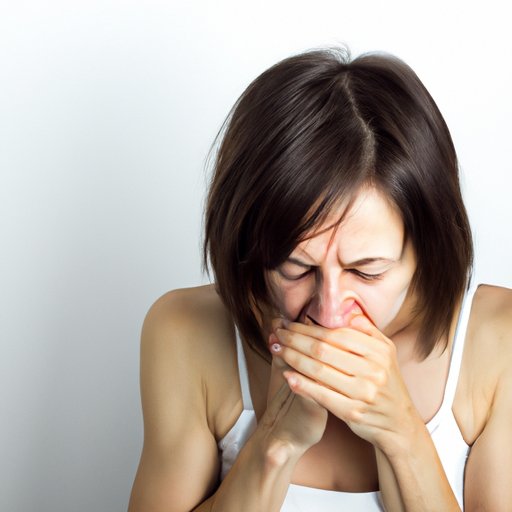
Introduction
Antihistamines are a common type of medication used to treat allergies. These medications work by blocking the effects of histamine, a chemical that is released by the immune system in response to allergens. While antihistamines are effective at relieving allergy symptoms, they are also known for causing drowsiness as a side effect.
For people who suffer from allergies and have trouble sleeping, the question of whether antihistamines cause sleepiness is an important one to answer. In this article, we’ll explore the science behind antihistamines and drowsiness, dispel common myths, and offer practical tips for maximizing the benefits of antihistamines without the side effects.
The Science of Drowsiness: How Antihistamines Affect Your Sleep
Antihistamines work by competing with histamine for specific receptors in the body. By blocking the histamine receptors, antihistamines can prevent the symptoms of an allergic reaction, such as itching, sneezing, and runny nose.
However, antihistamines can also have an effect on the central nervous system, which can lead to drowsiness. This is because histamine plays a role in regulating wakefulness, and by blocking histamine receptors, antihistamines can interfere with this process.
Additionally, some antihistamines are formulated to cross the blood-brain barrier, which means they can have a direct effect on the brain and cause drowsiness.
Fact or Fiction: Does Taking Antihistamines Cause Sleepiness?
There are many myths surrounding the question of whether antihistamines cause sleepiness. Some people believe that only certain types of antihistamines cause drowsiness, while others believe that the dosage or timing of the medication is the key factor.
To get to the truth, we need to examine the scientific evidence. Research studies have consistently shown that antihistamines can cause drowsiness. In fact, antihistamines are often used in over-the-counter sleep aids because of their sedative effect.
Exploring the Relationship Between Antihistamines and Drowsiness
While it is clear that antihistamines can cause drowsiness, there are many factors that can influence the relationship between these medications and sleepiness.
One important factor is the type of antihistamine being used. First-generation antihistamines, such as diphenhydramine and chlorpheniramine, are more likely to cause drowsiness because they can penetrate the blood-brain barrier more easily. Second-generation antihistamines, such as loratadine and cetirizine, are less likely to cause drowsiness because they are designed to be less sedating.
Another factor is the dosage of the antihistamine. Higher doses of antihistamines are more likely to cause drowsiness than lower doses. Additionally, taking antihistamines at night or before bedtime can increase the likelihood of drowsiness because they can interfere with the natural sleep cycle.
Other factors that can influence the relationship between antihistamines and drowsiness include age, weight, and overall health status. For example, older adults may be more sensitive to the sedative effects of antihistamines, while individuals with certain medical conditions may experience more pronounced side effects.
The Pros and Cons of Using Antihistamines for Sleep
Despite the potential for drowsiness, antihistamines can be an effective tool for managing allergies and improving sleep. In addition to relieving allergy symptoms, antihistamines can help promote sleep by reducing the amount of time spent awake during the night.
However, there are also potential side effects and risks associated with using antihistamines for sleep. In addition to drowsiness, antihistamines can cause dry mouth, dizziness, blurred vision, and constipation. They can also interact with other medications, such as tranquilizers and muscle relaxants, which can lead to dangerous side effects.
Before using antihistamines for sleep, it is important to weigh the potential benefits against the risks and consult with a healthcare provider.
Maximizing the Benefits of Antihistamines Without the Sleepiness
If you choose to use antihistamines for sleep and want to minimize the side effects, there are several tips and tricks that can help.
One strategy is to take the medication earlier in the day, rather than before bedtime. This can help reduce the impact on the natural sleep cycle and decrease the likelihood of drowsiness.
You can also experiment with different types and dosages of antihistamines to find the one that works best for you. Second-generation antihistamines are generally less sedating than first-generation antihistamines, but individual responses can vary.
In addition to medication, there are other lifestyle changes that can improve the effectiveness of antihistamines. These include avoiding caffeine and alcohol, practicing good sleep hygiene, and managing stress.
Natural Alternatives to Antihistamines for Sleep and Allergy Relief
If you are looking for a more natural approach to managing allergies and improving sleep, there are many alternative treatment options available. These include herbal remedies, such as butterbur and stinging nettle, as well as dietary changes and acupuncture.
For sleep, home remedies like aromatherapy, warm baths, and relaxation techniques can be effective. Lifestyle changes, such as regular exercise and reducing exposure to blue light, can also help promote better sleep.
Conclusion
Antihistamines can be an effective tool for managing allergies and improving sleep, but they can also cause drowsiness and other side effects. By understanding the science behind antihistamines and drowsiness, dispelling common myths, and exploring alternative treatment options, you can make informed decisions about your health and wellness.
If you are considering using antihistamines for sleep or allergy relief, be sure to consult with a healthcare provider to determine the best course of action for your individual needs.
Remember, there are many ways to promote better sleep and manage allergies. By taking a holistic approach and making healthy lifestyle choices, you can achieve optimal health and wellness.




